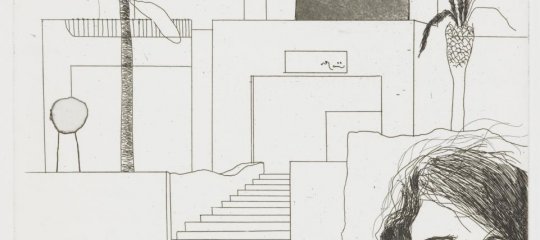<b>Μαθήματα εξ αποστάσεως για την ελληνική γλώσσα</b>
Κέντρο Ελληνικής ΓλώσσαςΘεσσαλονίκη 14 Απριλίου 2008
ΕΝΗΜΕΡΩΤΙΚΟ ΣΗΜΕΙΩΜΑ
Στο πλαίσιο προγράμματος που υλοποιήθηκε από το Κέντρο Ελληνικής Γλώσσας (Κέντρο Ελληνικής Γλώσσας-YπΕΠΘ-Ευρωπαϊκή Ένωση) αναπτύχθηκαν μαθήματα για την τηλεκπαίδευση/τηλεκατάρτιση διδασκόντων την ελληνική σε παιδιά και σε ενηλίκους σε όλον τον κόσμο. Σκοπός των μαθημάτων είναι να καλυφθούν οι ανάγκες επιμόρφωσης των διδασκόντων την ελληνική εκτός Ελλάδας, όπου οι συνθήκες είναι ιδιαίτερες και απαιτούν διδάσκοντες με επίγνωση της μεθοδολογίας της διδασκαλίας της ελληνικής γλώσσας.Τα μαθήματα τηλεκπαίδευσης με τίτλο «Διαδρομές στη διδασκαλία της ελληνικής ως ξένης γλώσσας» (http://elearning.greek-language.gr) άρχισαν να λειτουργούν για πρώτη φορά την 1η Αυγούστου 2007 και ολοκληρώνονται τέλος Απριλίου 2008. Αποτελούνται από επτά ενότητες (έξι και μία επαναληπτική), η κάθε ενότητα από 3 ως 4 κεφάλαια και οι περιοχές που προς το παρόν καλύπτονται είναι:
· Γλωσσική διδασκαλία σε παιδιά
· Διδασκαλία ξένης γλώσσας με Η/Υ
· Θέματα γλωσσικής διδασκαλίας
· Διδασκαλία της γραμματικής, του λεξιλογίου και της προφοράς
· Όψεις της γλώσσας
· Αξιολόγηση της επίδοσης των μαθητών
Κατά τη διάρκεια των μαθημάτων είναι δυνατό οι επιμορφούμενοι, εκτός από τις εργασίες που τους ανατίθενται, να υποβάλλουν ερωτήσεις σχετικές με το αντικείμενο που μελετούν και να παίρνουν από τους διδάσκοντες άμεσα τις απαντήσεις που χρειάζονται.
Το Κέντρο Ελληνικής Γλώσσας αποφάσισε την επανάληψη των μαθημάτων, για να ικανοποιηθεί ένας αρκετά μεγάλος αριθμός ενδιαφερομένων που επιθυμεί, και έχει ήδη υποβάλει αίτηση, την παρακολούθησή τους.
Τα μαθήματα θα αρχίσουν την 1η Ιουνίου 2008 και θα ολοκληρωθούν τον Απρίλιο του 2009. Για τη διευκόλυνση των συμμετεχόντων αλλά και των διδασκόντων, κρίθηκε απαραίτητο ο Αύγουστος να είναι μήνας διακοπών και το πρόγραμμα να συνεχιστεί το Σεπτέμβριο.
Μία εβδομάδα πριν από την 1η Ιουνίου θα δοθεί οι ευκαιρία σε όσους/ες γίνουν δεκτοί/ές να παρακολουθήσουν το πρόγραμμα με τη βοήθεια των διδασκόντων και των τεχνικών να πλοηγηθούν στην ιστοσελίδα για να εξοικειωθούν με τη δομή της.
Μετά το τέλος των μαθημάτων και αφού μεσολαβήσει χρονικό διάστημα τριών εβδομάδων για επαναλήψεις, οι συμμετέχοντες στο πρόγραμμα θα δώσουν εξετάσεις στα μέσα του Μαΐου 2008. Οι εξετάσεις θα αποτελούνται από δύο μέρη: αυτό που θα εξετάζει την επάρκειας γνώσης της ελληνικής γλώσσας σε πολύ υψηλό επίπεδο (Γ2) και αυτό που θα εξετάζει γνώσεις μεθοδολογίας της διδασκαλίας της ελληνικής ως ξένης γλώσσας. Τα εξεταστικά θέματα του δεύτερου μέρους θα βασίζονται στο περιεχόμενο των μαθημάτων και στη σχετική βιβλιογραφία. Σημειώνεται ότι θα εξεταστούν και στα δύο μέρη όλοι/ες ανεξαιρέτως.
Στους επιτυχόντες/επιτυχούσες στις εξετάσεις θα χορηγηθεί βεβαίωση επιτυχούς συμμετοχής στο πρόγραμμα. Σε όσους/ες για διάφορους λόγους δεν πετύχουν θα χορηγηθεί βεβαίωση παρακολούθησης του προγράμματος. Και στις δύο βεβαιώσεις θα αναγράφονται τα μαθήματα τα οποία οι κάτοχοι τους παρακολούθησαν καθώς και η διάρκεια του προγράμματος.
Αν πιστεύετε ότι το πρόγραμμα σας ενδιαφέρει, στείλτε συμπληρωμένη την υπεύθυνη δήλωση που ακολουθεί (σε word) στην ηλεκτρονική διεύθυνση: newlevels@komvos.edu.gr (ή antonopoulou@komvos.edu.gr) ως τις 15 Μαΐου 2008. Σας παρακαλούμε τα στοιχεία επικοινωνίας (ηλεκτρονική διεύθυνση, διεύθυνση αλληλογραφίας, τηλέφωνο, φαξ) να είναι ευκρινώς συμπληρωμένα.
Αν θέλετε να έχετε τηλεφωνική επικοινωνία μαζί μας, μπορείτε να τηλεφωνείτε (Δευτέρα-Παρασκευή 09:00-14:30) στα τηλέφωνα +30 2310 459 101 ή 459 574 και να ζητάτε την κ. Πρανέντση.
Οι συνεργάτιδες/ες μου κι εγώ είμαστε στη διάθεσή σας
Σας εκφράζω τις ευχαριστίες μας για τη συμμετοχή σας.
Με φιλικούς χαιρετισμούς
Νιόβη Αντωνοπούλου
αναπλ. καθηγ. Εφαρμοσμένης Γλωσσολογίας
Διευθύντρια του Τμήματος Στήριξης και Προβολής
της Ελληνικής Γλώσσας του Κέντρου Ελληνικής Γλώσσας
Επιστημονική υπεύθυνη του προγράμματος
Μπορείτε να "κατεβάσετε" (download) τη δήλωση ενδιαφέροντος για το πρόγραμμα από αυτό το σημείο










